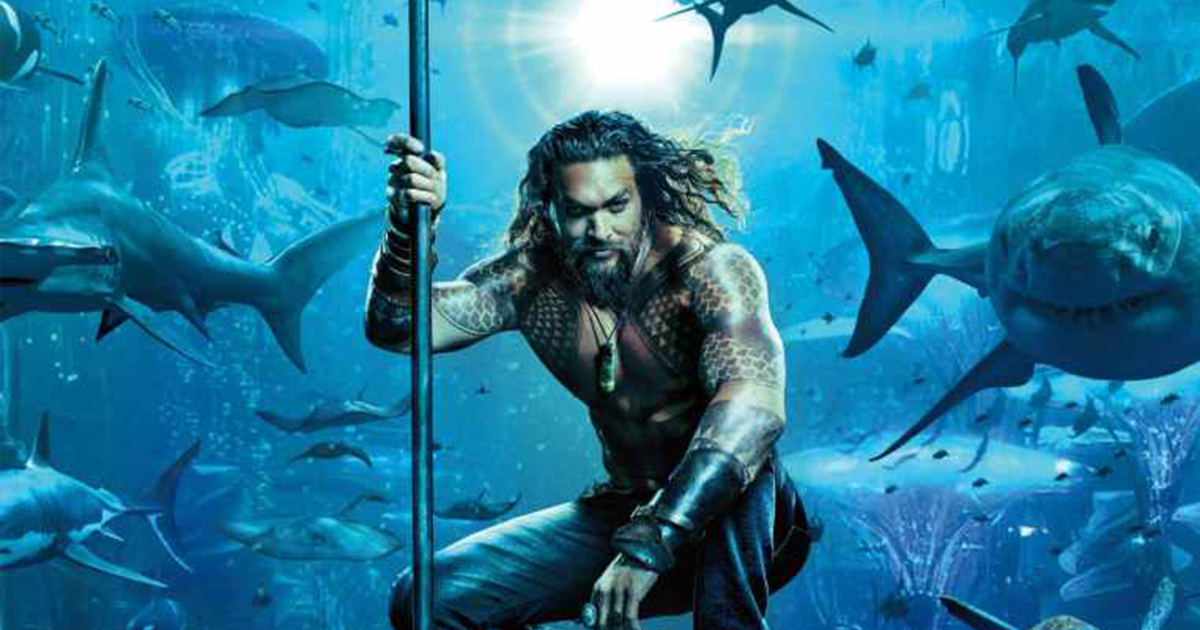
(Rated: PG [Canada] and PG-13 [MPAA] for sequences of sci-fi violence and action and for some language; directed by James Wan; stars Jason Momoa, Amber Heard, Willem Dafoe, Patrick Wilson, Nicole Kidman, Temuera Morrison, Dolph Lundgren, Yahya Abdul-Mateen II, Graham McTavish, Randall Park; run time: 143 min.)
Not so serious: “Aquaman” charts new course for DC Comics movies
by Ted Giese
“Aquaman” tells the story of Arthur Curry (Jason Momoa), the son of lighthouse keeper Tom Curry (Temuera Morrison) and Atlantean princess Atlanna (Nicole Kidman), who must come to terms with his royal lineage and fight to claim his rightful place on the throne of Atlantis.
With the help of Atlantean princess and love interest Mera (Amber Heard) and Atlantean vizier Vulko (Willem Dafoe), Arthur, known by the superhero name Aquaman, must find the ancient and powerful trident of the greatest king of Atlantis, King Atlan (Graham McTavish), and use it to prove his claim to the throne and fight his half-brother, King Orm Marius (Patrick Wilson). King Marius wishes to unite the undersea kingdoms in a war against the landwellers who pollute and deplete the world’s seas.
A subplot of the film concerns a family of pirates who become entangled with Aquaman during his quest. Their captain, David Kane (Yahya Abdul-Mateen II), blames Arthur for his father’s death.
With the aid of advanced Atlantean technology, Kane becomes the villainous Black Manta, Aquaman’s nemesis. Arthur’s regret over not saving Kane’s father contributes to his reluctance to take his rightful place on the throne of Atlantis, placing him squarely into the classic archetype of the reluctant hero.
To further complicate things, Arthur’s brother Orm desperately wants to keep the throne and increase his dominion, believing his status as a “pureblood” Atlantean gives him the right to the throne over his “half-breed” brother.
A longstanding rivalry, a lighthearted triumph
Many aspects of the film will be familiar to viewers who watched Marvel films such as “Thor” (2011) and “Black Panther” (2018). This is most likely no accident. For more than 50 years, the rivalry between DC Comics and Marvel Comics has been comparable to that between Pepsi and Coca-Cola: Both produce similar products, yet strive to stay just different enough to maintain a base of loyal customers.
This competition has made its way into theaters over the last 10 years, with both companies striving to establish their respective cinematic universes. Marvel was ahead of the curve with the surprise success of “Iron Man” (2008), while DC has been playing catch-up ever since, finally inaugurating an interconnected cinematic universe with the release of “Man of Steel” (2013).
In general, DC releases more serious, dour fare, while Marvel’s productions are flashier and more upbeat. While Marvel found its footing quickly, establishing an enjoyable if somewhat repetitive formula and signature tone, DC struggled to strike a balance between the campy and the dramatic, perhaps held back by the legacy of Christopher Nolan’s critically acclaimed Batman trilogy, which set a precedent for a dark tone. Attempts to recreate Marvel’s magic, such as “Suicide Squad” (2016) and “Justice League” (2017), were criticized as derivative and out of step with DC’s identity.
“Aquaman” is different, however. Having first played the part in “Justice League” (2017), the muscular and charming Momoa reprises the role of Aquaman, which takes place after the events of “Justice League.” Director James Wan successfully avoids the dreary look of previous DC films, providing a bright, vibrant color palette.
Wan, better known for horror films such as “Saw” (2004) and “The Conjuring” (2013), proved he could also do action when he directed the fast-car film “Furious 7” (2016). In “Aquaman,” Wan once again provides a fun, rollercoaster experience, with a deliberately lighthearted and goofy tone reminiscent of 1980s Saturday-morning cartoons. As soon as an octopus appears playing the drums, viewers know “Aquaman” is not going to be a dark, brooding, Batman-style film.
Pop-culture allusions and biblical parallels
What emerges as the film progresses is a movie made of strung-together scenes rather than a cohesive whole. If a viewer doesn’t like a scene, he can simply wait it out, and something different will come along soon.
Different scenes call to mind a wide range of diverse older films, from “Raiders of the Lost Ark” (1981) to “Pacific Rim” (2013) to “Power Rangers” (2017). To some, this mishmash of pop-culture allusions will feel like a loving homage; to others, a baffling, nonsensical mess.
Christian viewers may see parallels between certain themes of “Aquaman” and the biblical narrative, particularly the idea of a rightful heir facing off against a jealous pretender, as seen in the stories of Cain and Abel, Jacob and Esau, Joseph and his brothers, Kings Saul and David, and finally, the coming of the true King of kings and Lord of lords, Jesus the Christ, whom King Herod sought to murder as an infant.
Take all of these biblical narratives of brothers and rival kings and throw them in the blender with the King Arthur legends, and you get “Aquaman.” That said, it may be hard for viewers to make these connections due to the bombastic distractions Wan throws at the audience. Parents will want to note that, while not as dark and gritty as other DC films, the movie is still a little too violent for younger children.
Like the more focused “Wonder Woman” (2017), “Aquaman” has proved a box-office hit for DC Comics, which is finally standing on its own against Marvel. The question is whether the film will hold up over time or end up feeling stale and derivative once the buzz has ended.
In the end, audiences will be the ones to decide whether “Aquaman” is the hit it appears to be or is all wet.
Rev. Ted Giese (pastorted@sasktel.net) is lead pastor of Mount Olive Lutheran Church, Regina, Saskatchewan, Canada; a contributor to The Canadian Lutheran and Reporter; and movie reviewer for “Issues, Etc.” Follow Pastor Giese on Twitter @RevTedGiese.
Posted Jan. 7, 2019